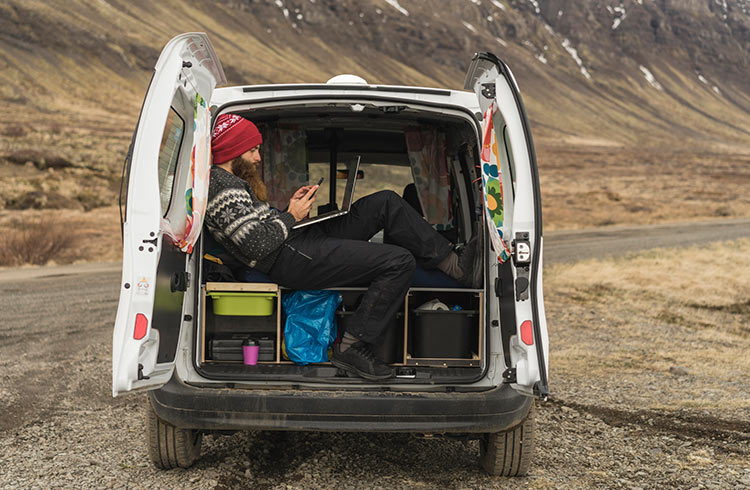Originality – not tired clichés – will make your travel stories sing. These clangers drive editors crazy.
 Photo © Getty Images / Westend61
Photo © Getty Images / Westend61
There are few genres of writing that attract more clichés than travel writing. Part of this is because travel writing is so visual – editors and readers want you to describe what you have seen. But often, writers can lapse into lazy generalizations and meaningless phrases, both of which will alienate your editor and your readers.
Clichés are bad because they reveal that the writer hasn’t thought enough about what they are writing about – they’re a lazy way to impart information to the reader, and will mark you out as a lazy writer. Clichés are often the first resort of a writer with nothing to say.
Originality in travel writing is key – tell the reader something they don’t know; be specific; be honest and figure out what you think of a place before you start writing. Here are some clichéd phrases you should avoid.
The worst offenders
'Where east meets west'
Usually found in articles about Istanbul, a city that travel writers seem to have decided is the actual place where the ‘East’ meets the ‘West’. Given the creep of globalization and the fact that elements of Asia can be found all over the Western world and elements of the West can be found all over Asia, East and West don’t actually ‘meet.’
'Buzzing eateries'
First of all, we are willing to bet that you have never heard anyone say ‘eatery’ out loud. It’s a bar, restaurant or café - call it that. Secondly, we have never heard a restaurant (or eatery) ‘buzz.’ A mobile phone can buzz, but a bar or restaurant? No.
'Hidden gem'
It’s not that hidden if you have found it, now is it? And oh, look, type the name of your hidden gem into Google and it’s all over the internet – it even has its own hashtag on Instagram. There are almost no real hidden gems anywhere, so unless you have discovered a previously unknown island, it’s best to not use this phrase.
'Must-see'
We know, we know; that market or museum, or cafe, is a must-see. We all simply must drop everything and go there immediately. However, not everyone is interested in the same things you are, so this sort of prescriptive writing can turn off a lot of readers. Show, don’t tell – describe the place you visited and let the reader decide if it’s worth visiting or not.
'Breathtaking' (interchangeable with 'jawdropping')
Did you literally hyperventilate when you reached the top of the mountain and saw the view? Did your jaw drop open and your tongue loll in your mouth? No, neither of those things happened, so why write that they did? What exactly can you see? Describe the colors, the sounds, the smells; you know, the actual view. Hyperbole is to be avoided at all costs.
'Welcoming/friendly locals'
Wait, so you met everyone in the town/city/village? Were they all welcoming? Are you sure that the ‘local’ who smiled at you on the street was being friendly? Maybe she was just looking at you in pity as you grinned inanely at every passerby. Is everyone in your home city friendly? Of course not. And guess what, the same rule applies in every town and city around the world. If one specific person was friendly to you and that interaction is something you think is of interest, write about that.
'A land of contrasts'
Unless everything is exactly the same in the place you are traveling to (hint: it isn’t), then this phrase is not only clichéd, it’s glaringly obvious. Every land (and city, town and village for that matter) has things that are different from each other. The key here is to let the reader know what those differences are: colonial-era buildings next to glass skyscrapers; a vintage clock repair shop next to a slick café.
'A place that time forgot'
This means nothing. Time is not something that either remembers or forgets, so don’t write it as such. If you mean that the small Italian village you are staying in has few signs of modernity, then write that. Tell the reader what exactly you mean – be specific (see below) and allow the reader to paint a picture in their mind’s eye. That’s what good travel writing should do. Ignore this rule and the only thing forgotten will be your mediocre travel article.
Improve your writing
Now that's out of the way, here are some rules of thumb that can help you ensure your articles are compelling and cliché-free.
Be specific
Instead of writing that the market has ‘something for everyone’ (cliché alert!), be specific. What do the stalls sell? How much is that rug? What’s it made of? Did you haggle? Details are the building blocks of good travel writing – without them, your article will be lifeless and uninspiring. Make sure you take lots of notes, so when you do sit down to write your piece, you don’t have to resort to empty, meaningless phrases.
Be honest
Look, we get it, you want to write about your life-changing trekking experience and that’s fine. But when we read an article in which everything is amazing and perfect and wonderful, we not only start to doubt your sincerity, we get bored. Did the pyramids underwhelm you? Was that jungle trip ruined by the multitude of creepy crawlies you encountered? Was that small Croatian fishing village overrun by other visitors? Tell us all the gory details – that’s what will keep us reading.
Be original
Originality is the essence of great writing. What are you trying to say? Has it been said before? Can you figure out a new angle? Do your own life experiences bring something new to the article?
Download our How to Make a Living as a Travel Writer guide

Related articles
Simple and flexible travel insurance
You can buy at home or while traveling, and claim online from anywhere in the world. With 150+ adventure activities covered and 24/7 emergency assistance.
Get a quote


No Comments